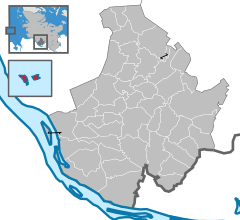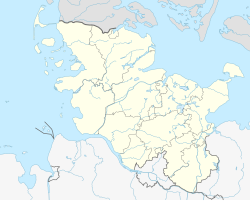Heligoland
Helgoland | |
|---|---|
 | |
Location of Heligoland within Pinneberg district  | |
| Coordinates: 54°10′57″N 7°53′07″E / 54.18250°N 7.88528°E | |
| Country | Germany |
| State | Schleswig-Holstein |
| District | Pinneberg |
| Government | |
| • Mayor | Thorsten Pollmann (Ind.) |
| Area | |
• Total | 1.7 km2 (0.7 sq mi) |
| Elevation | 61 m (200 ft) |
| Population (2022-12-31)[1] | |
• Total | 1,253 |
| • Density | 740/km2 (1,900/sq mi) |
| Time zone | UTC+01:00 (CET) |
| • Summer (DST) | UTC+02:00 (CEST) |
| Postal codes | 27498 |
| Dialling codes | 04725 |
| Vehicle registration | PI, AG |
| Website | www |
Heligoland (/ˈhɛlɪɡoʊlænd/; German: Helgoland, pronounced [ˈhɛlɡoˌlant] ; Heligolandic Frisian: deät Lun, lit. 'the Land', Mooring Frisian: Hålilönj, Danish: Helgoland) is a small archipelago in the North Sea.[2] A part of the German state of Schleswig-Holstein since 1890, the islands were historically possessions of Denmark, then became the possessions of the United Kingdom from 1807 to 1890, and briefly managed as a war prize from 1945 to 1952.
The islands are located in the Heligoland Bight (part of the German Bight) in the southeastern corner of the North Sea and had a population of 1,127 at the end of 2016. They are the only German islands not in the vicinity of the mainland. They lie approximately 69 kilometres (43 miles) by sea from Cuxhaven at the mouth of the River Elbe. During a visit to the islands, August Heinrich Hoffmann von Fallersleben wrote the lyrics to "Deutschlandlied", which became the national anthem of Germany.
In addition to German, the local population, who are ethnic Frisians, speak the Heligolandic dialect of the North Frisian language called Halunder.



